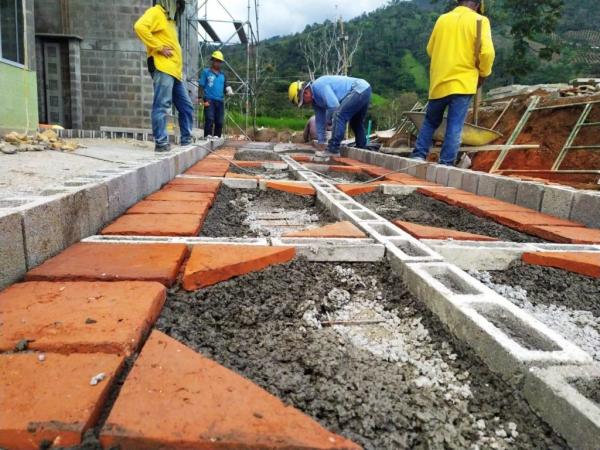Since its creation eight years ago, works for taxes have become an important strategy to ensure the development of the regions, through joint work between the State and private companies, thanks to which they have been carried out 410 projects in areas affected by the armed conflict, with an investment close to $3 billion.
Through this commitment, projects have been carried out to promote education, basic sanitation, delivery of technological aids and improvement of roads, among others, which have benefited seven million Colombians, in 264 municipalities and hand in hand with more than 200 companies that have chosen this path to comply their tax obligations, either through agreements or under the figure of trusts, as established by the regulations.
Read here: Unemployment in Colombia: eight of 13 activities reported job losses
Although between 2018 and 2021, this initiative did not have a major variation in its quota of $250,000 million to work with, in recent years it has had an increase in budget allocations, first to $500,000 million in 2022, then to $800,000 million in 2023 and this year moves with a margin of maneuver of $1 billion; in what has been considered by this Government as one of its most important social commitments.
However, Portafolio learned that this runs the risk of changing due to the cash crunches that the Nation faces and the dependence of next year’s spending projections on the financing law that is in motion. in the Congress of the Republic and that seeks to secure $12 billion for the 2025 Budget.
Municipalities
Properati
Although one of the criticisms of the management of the State’s finances this year has been that the money that was allocated in 2023 is not being executed, this is not the case of works for taxes, given that they have already used 90% of the money that was allocated and they expect to close margins very close to those of previous periods, in which they have managed to take advantage of up to 98% of the quota, showing that the problem is not due to lack of efficiency.
Now, although the evidence shows that the strategy is good and it gives results, since a large number of companies have believed, have joined and as time goes by there are more and more resources to invest; The priority for next year would be to ensure clearly necessary expenses and from there begin to carefully review what is maintained and what can be postponed.
Specifically, there are two unfavorable scenarios for this program. The first is that the financing law does not pass and that the $12 billion that depends on said project must be cut, given that although the Minister of Finance, Ricardo Bonilla, assured that they would be frozen, the conversations within his portfolio revolve more around a cut, to avoid unnecessary fiscal pressures forward.
Other news: Board of Directors of the Banco de la República reaffirms its inflation goal of 3% for 2025
The second has to do with the current economic situation and a large number of projects that were left unexecuted from the current period and would be rescheduled for 2025, which would tighten the State’s cash flow and the order would be to prioritize spending over betting. fundamental of President Gustavo Petro; opening the possibility that this part will have to be cut.
The final decision on what happens with the tax works program will be made at the next meeting of the National Council of Economic and Social Policy (Conpes), where each of the entities will deliver their balance sheets and budget aspirations based on everything above, decisions will be made within the Ministry of Finance. The intention of the strategy’s mourners will be for said quota to increase or at least remain the same as for 2024.

PDET.
EL TIEMPO Archive
success story
During the accountability of the National Territory Agencythe director of the entity, Raúl Delgado, stated that these programs are a clear example that coordination between the private and public sectors is possible and that, if things are planned and the real needs of the communities are taken into account, communities, success stories can be generated.
“In this, as in all cases, the resources are from the Government, they are from taxes, but we recognize the company’s decision, that, instead of paying the tax directly, it does part of it by doing things like this provision . This is how road projects have been carried out, health projects, aqueduct projects, and photovoltaic energy projects have been carried out, and I must clarify that the companies that invest the most in works for taxes are the companies in the mining and energy sector,” he said.
You may be interested in: Between 2028 and 2029, three energy transmission projects will come into operation
Works for taxes is a mechanism that allows companies with gross income greater than 33,610 Tax Value Units (UVT) to allocate up to 50% of their income tax to territorial impact projects. in 170 PDET municipalities, 344 ZOMAC and Amazonian Departments, through two modalities.
“The first is the Trust, through which investments are made through trust funds, and the tax obligation is extinguished upon completion of the works; and the second, Agreement, which consists of the investment of own resources through agreements with Competent National Entities, receiving Territorial Renewal Titles (TRT) as tax compensation,” said Delgado.
One of the most notable success stories of this program It is the public school that Crepes & Wafles built in Cajamarca, Tolima, with the authorization of the Ministry of Education and the Department of Education of the department, which was delivered in September 2023.

Investment
iStock
“In the drinking water and basic sanitation sector, the construction of an aqueduct in Tame, Arauca stands out, with an investment of $8,341 million that benefited 1,300 people in rural and urban areas, and the development of a storage tank in Turbo , Antioquia, with $12,703 million, which improved access to drinking water for 50,000 inhabitants,” said Raúl Delgado.
The Territory Renewal Agency also reported that the leading departments in implementation are Antioquia, with 56 projects; Tolima, with 58 projects; and Arauca, with 26 projects. In 2024, more than 100 companies participated in 80 projects, and It is expected to close the year with 117 projects and $900,000 million invested.















